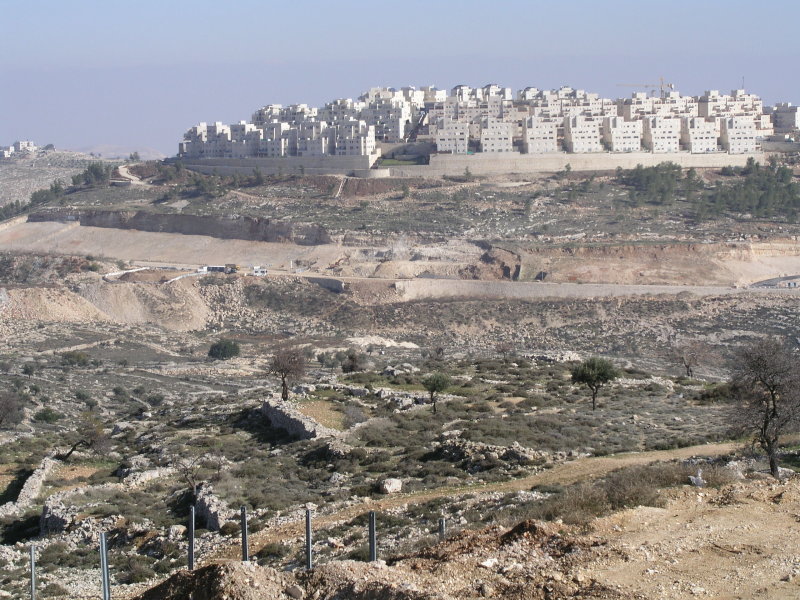
Last Friday, the Oxford Union hosted the first in a series of talks entitled “Head to Head” organised by and filmed for Al Jazeera. In this first talk, Al Jazeera’s Mehdi Hassan interviewed the outgoing head of the Yesha Council, Dani Dayan on the subject of Israeli settlements and the prospect for peace between Israel and Palestine. The Yesha Council (an acronym for the Judea, Samaria and Gaza Council) is an umbrella organization of municipal councils of Jewish settlements in the West Bank and constitutes a formidable force within Israeli politics – pressing mainly for continuity of the settlement program. Dani Dayan, a secular businessman, has led the council since 2007. The talk thus presented a unique opportunity to question a leading defender of what many regard as one of the most flagrant and persistent breaches of international law by a democratic state today.
Israel has been repeatedly criticised by the international community for its pursuit of the settlement programme. There are currently around 350,000 Israelis living in settlements in what the international community terms the West Bank but which the settlers call Judea and Samaria. This figure does not include the approximately 200,000 Israeli inhabitants of East Jerusalem. Both East Jerusalem and the West Bank have been under Israeli occupation since 1967 but neither is recognised by the international community as Israeli territory. The Fourth Geneva Convention specifically states that, in cases of occupation of the land of one state by another, “the Occupying Power shall not deport or transfer parts of its own civilian population into the territory it occupies.” Under international law, therefore, these settlements are illegal. This view was endorsed by the UN Security Council in Resolution 446 which refers to the Fourth Geneva Convention as the applicable legal instrument and calls upon Israel to desist from transferring its own population into the territories.
In addition to presenting a significant barrier to resolution of the Israel-Palestine conflict, by constituting a substantial obstacle to the creation of a Palestinian state in the West Bank, the ICJ similarly notes that the existence of these settlements “violates the basic human rights of the Palestinians by impeding liberty of movement and the inhabitants’ right to work, health, education and an adequate standard of living.” As shown by the map below, Israeli settlements exist almost throughout the West Bank. If these were not evacuated upon the creation of a Palestinian state this would mean Palestine would be no more than a patchwork state with different communities unable to access one another. The settlements that currently exist are already interconnected by roads that cut through Palestinian settlements, restricting the ability of Palestinians to travel from one part of Palestine to another. Further, as the Israeli authorities continue to build more settlements and more roads the situation is getting worse year on year.
Given the illegality of the settlements, as well as the evident harm that they do to the prospects for peace, Mr Dayan’s talk thus offered an interesting opportunity to take stock of the justifications for Israel’s West Bank settlement program. It was clear to Mr Dayan that the Israeli settlers did in fact have both a moral and political right to live in the West Bank. From what was, at times, a confused and halting justification for this position your correspondent gleaned three interrelated strands of argument: that the lands of Judea and Samaria are the Jewish people’s “homeland;” that while the area is also claimed as a homeland by the Palestinians this merely means the territory is contested and does not detract from the Jewish claim and finally; that the Palestinians lost their right to this land by engaging in violence in 1948 and 1967.
None of these claims are new, of course. What is strange, however, is that so many voices within Israel perceive this moral case to be internally coherent and justified when a brief analysis finds it woefully lacking in both logic and foundation.
The first strand of the argument – that the Jewish people have a historical claim to the land – is a matter of ongoing dispute. To this day, there remains little consensus on the moral and ethical means by which states may lay claim to land or peoples may deem land their homeland. Even if one were to accept this claim, however, one would have to – as Mr Dayan does – accept that the Palestinians also have this claim, having inhabited the lands for nearly 2,000 years. So this point merely leaves us with two competing national claims.
The interesting aspect of the argument, therefore, is where Mr Dayan attempted to justify why the Jewish claim should be prioritised over the Palestinian claim. His first line was to suggest that where two competing claims exist, that is unfortunate and one is justified in fighting for one’s own. Sensing that this assertion carried little moral weight, Dayan then argued that while Israel was willing to accept partition in 1948, and at that time accepted the Palestinian’s moral claim to some of the land, the Palestinians then lost this claim by engaging in violence. In violently resisting the creation of Israel in Palestine, Mr Dayan argued the Palestinian’s thereby forfeited their right to the land.
This is a reading of international morality that many defenders of the settler movement assert with confidence yet it is actually a highly unusual conception of international ethics. Nowhere in international law or in historical precedent is the idea supported that through engaging in violence a people thereby lose their right to exist as a state. While partial territorial confiscation as punishment for losing war was normal in pre-modern times there was never a case where an occupying power justified their absorption of the entire territory of a state and displacement of its population on the moral grounds that they lost the right to it by engaging in violence. Moreover, even this conception of territory confiscation as punishment is now generally considered redundant and unethical. Your correspondent, therefore, found it hard to accept the argument that the Palestinians have lost their right to self-determination in their homeland simply because their forefathers violently resisted partition. To accept this would be to say that any nation or community which engaged in violence against another would similarly lose its right to exist. I am not sure very many of today’s nations would pass this test.
When questioned on his views for the eventual solution of the conflict Mr Dayan was decidedly evasive. Initially he simply said that “there was no solution,” a statement which felt as disingenuous as it was impractical. When pressed he stated his firm opposition to both the one-state solution and the two-state solution, and any solution which involved dismantling the settlements. According to Mr Dayan, the one-state solution would mean Israel was no longer Israel and thus was unacceptable to any Zionist, the two state solution would result in an intolerable security threat to Israel as the West Bank would become “just another place from which terrorists would launch rockets” and dismantling the settlements would be morally wrong as it would entail forcibly removing people from their rightful homeland. He also stated his slightly more equivocal opposition to the idea of removing the Palestinians from the West Bank and rehousing them elsewhere, stating that any plan to move any people from their homes would be wrong. When it was pointed out to him that he was rapidly running out of realistic options, he finally stated that the solution would be of a sui generis nature. The Palestinians should not have to leave but could not have their own independent state. Rather, they would be governed in a kind of political system “whose like we have not seen,” not independent but not occupied, not as one unit, but in disparate groups between the Israeli settlements. Meanwhile, settlements would continue to spread throughout the West Bank. To the critical ear, this solution actually sounds remarkably like something the world has witnessed before, namely the bantustans of South Africa. Mr Dayan argues that such a comparison is deeply flawed, yet he offers no conclusive reason as to why the two systems are different beyond the fact that South Africa was “racist,” presumably implying that Israel’s desire to exclude Palestinians from their state and deny them a state of their own is based on higher motives.
What then can we learn from this interrogation of the Israeli settler movement? I believe that two conclusions can be drawn. The first is that the settler movement is not naïve about the implications of its actions for the possibility of a Palestinian state, rather the policy that they advocate is explicit in seeking to deny the Palestinians a state of their own and to deny them integration into the state of Israel itself. Secondly, given the first conclusion, if the international community remains unwilling to take action to compel Israel to desist from its current policy and dismantle the settlements, they need to start thinking about where the Palestinians are going to go for, if the settler movement has its way – and there is good reason to believe it might, given their power in Israel – there will be no Palestine and no place for the Palestinians in a Greater Israel.
Kate Brooks is an Oxford MPhil student in International Relations.







1 Comment
Yesterday I saw this discussion with Dani Dayan http://www.youtube.com/watch?v=m6lwgCs2PNM and then found your article. Thank you for expressing similar thoughts in English.